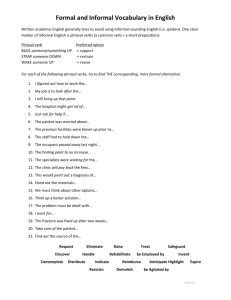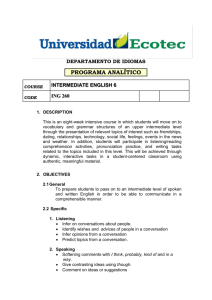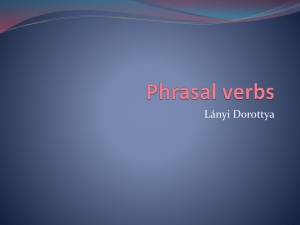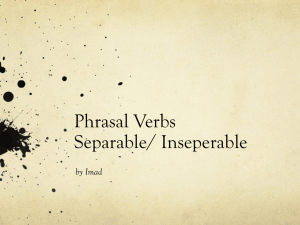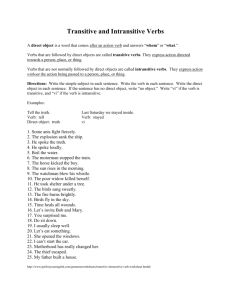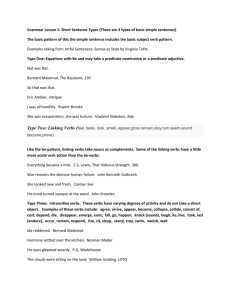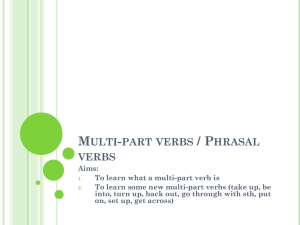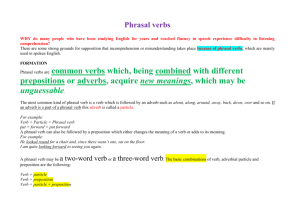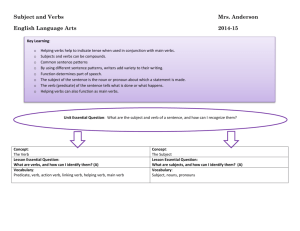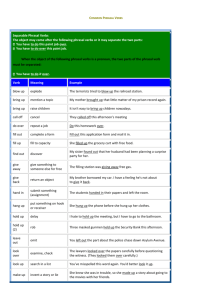PHRASAL VERBS-online list
advertisement
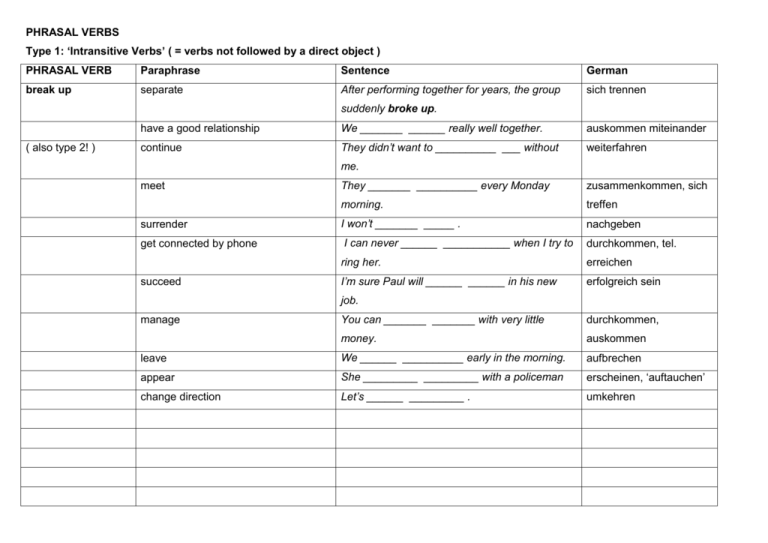
PHRASAL VERBS Type 1: ‘Intransitive Verbs’ ( = verbs not followed by a direct object ) PHRASAL VERB Paraphrase Sentence German break up separate After performing together for years, the group sich trennen suddenly broke up. ( also type 2! ) have a good relationship We _______ ______ really well together. auskommen miteinander continue They didn’t want to __________ ___ without weiterfahren me. They _______ __________ every Monday zusammenkommen, sich morning. treffen surrender I won’t _______ _____ . nachgeben get connected by phone I can never ______ ___________ when I try to durchkommen, tel. ring her. erreichen I’m sure Paul will ______ ______ in his new erfolgreich sein meet succeed job. You can _______ _______ with very little durchkommen, money. auskommen leave We ______ __________ early in the morning. aufbrechen appear She _________ _________ with a policeman erscheinen, ‘auftauchen’ change direction Let’s ______ _________ . umkehren manage Type 2: ‘Transitive separable verbs’ The direct object can go before the particle, i.e. it can separate the verb from the particle e.g.: ‘I looked up the word.’ – ‘I looked the word up.’ The object pronoun can only go before the particle! e.g.: ‘I looked it up.’ PHRASAL VERB Paraphrase Sentence German call off cancel They called the concerts off. / absagen, abbrechen They called off the concerts. / They called them off. support They were always there to unterstützen _______ me _____ when I was in trouble. make someone leave / force They wanted to _________ me someone to leave _______. write down I didn’t _________ _________ ( sich ) notieren everything she said. give to someone They _________ _________ über-/hergeben, aushändigen some keys. reject, refuse My applications were _______ ablehnen ________ continue I ___________ ________ my fortsetzen search. postpone I ________ ________ my auf-/verschieben holiday. find a way of doing something They __________ _______ a entwickeln, erarbeiten plan. tell sth that you should keep She _________ their secret secret __________. finish / stop ( with ) I can’t ______ ______ chocolate. aufgeben invent He obviously ________ his erfinden excuse _______. turn off, switch off Don’t forget to ______ _______ ausschalten the lights before you leave. lift, raise ( from the floor/ground _______ ________ these scraps etc. ) of paper! ( … clothes ) get dressed ______ ________ a coat. It’s auflesen anziehen ( Kleider ) cold outside. increase ( weight ) She’s ____ _____ some weight zunehmen over Christmas. perform They first ____ _____ this play aufführen last month. raise, increase This shop has _____ ______ its prices again! Type 3: ‘Transitive inseparable verbs’ The direct object can only go after the particle, i.e. it cannot separate the verb from the particle. e.g.: ‘We had to look after the children. The object pronoun can only go after the particle. e.g.: ‘We had to look after them.’ PHRASAL VERB Paraphrase Sentence German go over discuss They go over plans for next durchgehen, besprechen week. / They go over them. rely on I thought I could _____ ____ zählen auf, sich verlassen auf them. take care of I expected them to _______ sich kümmern um, sorgen für ______ me when I needed them. recover from manage to reach He _____ ________ the flu very sich erholen von, hinwegkommen quickly. über I can’t ____ _______ things on erreichen the top shelf: I’m too small. move towards They _________ _______ a zuhalten auf nearby forest. try to find She was ___________ ______ suchen firewood. succeed in living (/working … ) I can’t ____ __________ it. ohne auskommen, verzichten auf without look / behave like an older With her dark hair and eyes, she relative _________ _________ her father. meet / find by chance I ________ __________ it (zufällig ) begegnen, finden unexpectedly. Type 4: ‘Transitive inseparable verbs with two particles’ The same rules apply as with Type 3! e.g.: ‘I look forward to the meeting / to meeting you.’ - ‘I look forward to it.’ ( Note: some ‘Type 1’ phrasal verbs can be turned into ‘Type 4’ phrasal verbs: e.g.: ‘They get on well.’ ( Type 1 ) - ‘They get on with their parents.’ / ‘They get on with them.’ ( Type 4 ) ) PHRASAL VERB Paraphrase Sentence German get on with have a good relationship with I have always got on well with auskommen mit the other members. to encounter They have ________ _____ stossen auf ( Schwierigkeiten ) _______ some difficulties. to tolerate I _____ ______ ______ this for sich abfinden mit, ertragen a while. to escape the consequences of They’re not going to _____ ungestraft davonkommen mit _______ ______ it! to avoid doing something that you She is always trying to ______ should do ________ _______ doing the washing. sich drücken um find time to do something I finally _____ _________ to dazu kommen ( etwas zu tun ) watching the programme I recorded. reduce I _____ _______ ______ what I reduzieren spent on luxuries. no longer have We’ve _____ _______ _______ milk again! ausgehen ( Vorräte … )
